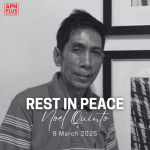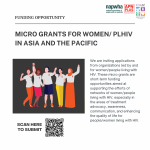BACKGROUND
The Asia Pacific Network of People living with HIV (APN+) is community-led network, formed in 1994 by People living with HIV (PLHIV) to develop a collective response to issue face by PLHIV in Asia Pacific region Pacific by better linking with global platforms, and supporting country level actions by and for PLHIV. Throughout the network existance, APN+ has achieved success in addressing HIV-related stigma, improving access to treatment for HIV and co-infections, and creating more space for positive voices to be heard. APN+’s early advocacy work resulted in some countries updating their HIV treatment guidelines to ensure the best treatment options were available. APN+ advocacy also resulted in improved access to treatment for TB and hepatitis C by changing the practices of intellectual property laws to be more open to generic medicines.
The International Treatment Preparedness Coalition (ITPC), formed in 2003, is a global coalition of PLHIV community activists working to achieve universal access to optimal HIV, HCV, and TB treatment for those in need. In 2024, ITPC was awarded a project by Unitaid called “The Solidarity Project,” which aims to support the use of TRIPS flexibility and other Intelectual Property-related solutions to facilitate access to health services. APN+’s role within the Solidarity Project is to serve as the Asia Hub and coordinate efforts in four countries—India, Indonesia, Thailand, and Vietnam—to implement the project at the country level. The Solidarity Project goals are : 1). To improve public health outcomes and generate financial savings by the strategic use of TRIPS Flexibility, 2). To increase the availability of generic and biosimilar medical products for preventing and treating HIV, TB, HVC, CC and Public health emergencies, and 3). To make the affordability of generic and biosimilar medical products for preventing and treating HIV, TB, HVC, CC and Public health emergencies.
Country Situations in Asia Countries:
India has become the third-highest number of HIV/AIDS patients after South Africa and Nigeria, which WHO predicted to lose 1.5 percent of its GDP due to the death. In the 1990s, the situation of HIV/AIDS-infected persons in need of anti-retroviral drugs was increasing, leading to the commitment of the TRIPs Agreement and Public Health in 1995. In addition, the country has stipulated to continue providing generic HIV/ADIS medicines at a low cost domestically.
Following India, Indonesia’s HIV/AIDS-infected persons are categorized as two major epidemics in Asia driven by injecting drug use, after China. In 2018, Indonesia had a total of 640,000 PLHIV; 38,000 among them died, and 46,000 people were newly infected that year; only 51% of the suspected population knew their status, and 17% of those living with HIV received treatment. Despite the fact that the huge number of PLHIV in Indonesia, the challenges of medicine access remain. PLHIV still needs to pay extra fees for anti-retroviral therapy. Continuously, although the Anti-retroviral medicine can be accessed, it is also in limited supply.
After Indonesia, Malaysia is indicated as one of the Southeast Asia Countries where HIV/AIDS is infectious through injecting drugs. Between 1988 and 2006, a cumulative total of 300,241 drug users were detected, and HIV/AIDS infected an estimated 45% of injecting drug users. Since 2004, Malaysia has issued a compulsory license for HIV/AIDS medicines patents. However, it has failed price negotiations. As a result, the affordability of HIV/AIDS medicine has remained a challenge in this country.
In Pakistan, the estimated number of PLHIV was 120,000 in 2009, corresponding to an adult HIV prevalence of 0.1%. The heterogeneity and interlinking of injecting drug use and risky sexual behavior, combined with low levels of HIV knowledge and prevention and high levels of other sexually transmitted infections (STIs), indicate that there is potential for a rapid spread of HIV through the bridging population. However, individuals in Pakistan experience high costs of medical expenses. In fact, there were only 30% of PLHIV received the ARV treatment.
Additionally, a study of health in Thailand found that HIV/AIDS was one of the top five causes of total mortality among men and women. Thailand asserted that HIV/AIDS-infected persons accounted for 610,000 Thais. As a result, ART adherence is a critical issue for People Living with HIV (PLH) in Thailand. As a result of the reduction in the cost of ART in Thailand, the Thai Ministry of Public Health instituted the Access to Care (ATC) program that covered 6000 to 10,000 patients with HIV infection in 2002. Moreover, Thailand noted that the licenses were critical to preventing either severe economic hardship, including bankruptcy or certain death, without treatment. In 2007, Thailand, after failing to negotiate a price for the HIV/AIDS drug Kaletra (lopinavir/ritonavir) with Abbott, invoked the legal mechanism of compulsory license.
In Vietnam, there were 248,500 HIV-positive cases managed by 2011 in the country, with 70% of them having a history of drug injection. Only 68% or 82,687 HIV/AIDS patients received the ART treatment. Medicines play a crucial role in improving health outcomes. However, they have become unaffordable for the lowest-paid unskilled government worker, thus being unaffordable for the large percentage of the population who earn less than this benchmark [38]. Pharmaceutical policy reform is therefore central to current efforts to improve Vietnam’s healthcare system. Nevertheless, the study of specific ART medicine affordability still lacks.
The obstacles experienced by the PLHIV are in obtaining essential medicines. The limited availability of medicine influences high medication prices. In fact, there are several additional factors contributing to the obstacles, such as unreliable medicines, poor prescribing practices, and poor adherence of patients. This situation is experienced by lower middle-class countries in Asia, like India, Indonesia, and Pakistan and upper-middle-class countries in Asia, such as Malaysia, Thailand and Vietnam. Therefore, the affordability of healthcare costs, including medicine, is a solution for the sustainability of biomedical innovation. For instance, providing effective drugs that are affordable to all patients, including the disadvantaged or people in poverty, can sustain their finances over time and, ultimately, improve the health and well-being of the nation. In order to support the continuous effort, the mapping financial savings by the strategic use of TRIPS Flexibility, with the availability and affordability of generic and biosimilar medical products for preventing and treating HIV, TB, HVC, CC and Public health emergencies, become an ultimate of this research for the better of public health outcomes of PLHIV.
Consultant Scope of Work
The APN is seeking a consultant to coordinate conducting a comparative intellectual property study for India, Indonesia, Malaysia, Pakistan, Thailand and Vietnam. This research is intended to:
- Inform legal strategies to improve access and affordability to HIV, HCV and TB medicines;
- Provide a report survey of making medicine available and affordable for civil society on national IP legislation;
- Serve as an advocacy tool with decision-makers to push for law reform.
Duration of Consultancy
- 1st October – 20 December 2024
Deliverables
- Draft survey for gathering data on national patent laws, regulations and national guidelines affecting access and affordability to medicines, including healthcare financial system (at least 1 coordination call) – (no more than 4 days)
- Analysis and evaluation of the level of flexibility in the respective national laws based on raw data and preliminary analysis provided by national-level experts—(no more than 6 days.)
- Drafting comparative narrative report on the TRIPS-flexibilities, TRIPS-plus provisions in intellectual property laws in the three countries, their application in practice and on existing patenting practice in the area of pharmaceuticals in the countries – (7 days).
Education & Experience Requirements
- Minimum 5-8 years relevant experience in collecting and analyzing patent law and pharmaceutical codes or similar experience with other areas of law (human rights, etc.)
- Experience working in or for the nonprofit, philanthropic sector or related field is a plus
- Graduate degree in law, public health, international studies, sociology, economics, etc.
- Advanced computer experience is required, including MS Office: Word, Excel, Access, Outlook, PowerPoint, and Adobe.
- Interest, experience, and/or academic training in HIV/AIDS and HCV, public health, human rights, international development, patent law, or related field is a plus
- Experience working on IP issues and/or patent law, preferably in middle-income and upper-middle-income countries in coordination with civil society groups is an advantage
Key Competencies
- Community engagement
- Written and oral communication skills
- Judgment and problem-solving
- Planning and organizing
- Attention to detail
- Information gathering and monitoring
- Teamwork and collaboration
Compensation
This shall be performed in partial payments for the number of days spent (but not exceeding 15 days) upon completion of each deliverable satisfying APN’s quality. The consultant shall be paid within 30 days of delivery of the invoice.
To Apply:
Send Curriculum Vitae with a description of work (NO phone calls please)
Send resume with cover letter & consultancy daily rate to [info.apnplus@gmail.com] with the subject line “Asia Pacific IP Comparison Study – Application: Your Name” by Thursday, October 12th, 2024 COB




